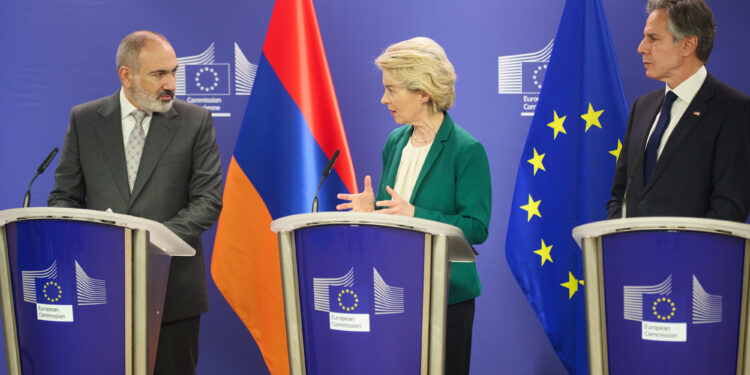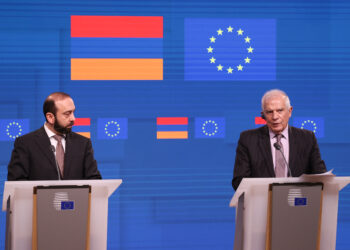Brussels – The European Union is seeking to become Armenia’s trusted partner to take away Russia’s last ally in the Caucasus region. “We are fulfilling the promise made in October to stand by Armenia and provide a vision for our partnership,” assured European Commission President Ursula von der Leyen during a press point with Armenia’s prime minister, Nikol Pashinyan, the U.S. Secretary of State, Antony Blinken, and the EU High Representative for Foreign Affairs and Security Policy, Josep Borrell, before today’s (April 5) high-level meeting in Brussels.
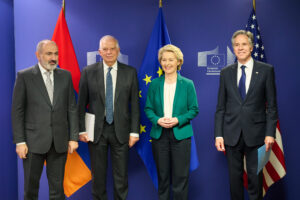
A partnership that “will be shaped on a €270 million Resilience and Growth Plan in grants over the next four years” is the announcement of von der Leyen, who promised that the Union will invest in “Armenia’s economy and society.” Starting with small and medium-sized enterprises, to “key infrastructure projects, renewable energy production in Armenia and better interconnections with Georgia.” As stated by the EU executive, the Resilience and Growth Plan for Armenia will boost trade diversification, strengthen sectoral cooperation with the European Union, and “help meet the long-term needs of displaced persons” from Nagorno-Karabakh. It is precisely this “priority” that Chairwoman von der Leyen also addressed, recalling that “since last September, we have provided over €30 million in support for the refugees. We are ready to do more to support long-term integration.”
The exodus of the ethnic Armenian population toward Yerevan (over 100,000 refugees poured into a country of 2.8 million) began after the Azerbaijani army seized the self-proclaimed Republic of Artsakh on September 20, 2023. There has been no progress since then in contacts between Brussels, Yerevan, and Baku to arrive at the comprehensive peace agreement that Armenia’s prime minister, Nikol Pashinyan, from the Strasbourg Chamber, had projected for late 2023 if only Azerbaijan’s President, Ilham Aliyev, had decided not to obstruct the process as he had done at the Third European Political Community Summit on October 5 in Spain (when he deserted the quintet with the President of the European Council, Charles Michel, the German Chancellor, Olaf Scholz, and the French President, Emmanuel Macron). Tensions remained consistently high until the most serious episode last February 13, when four Armenian soldiers were killed in a firefight with Baku forces along the border.
The conflict between Armenia and Azerbaijan
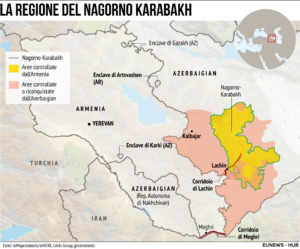 A frozen war has been going on since 1992 between Armenia and Azerbaijan, with recurring outbreaks of armed violence centred in the breakaway region of Nagorno-Karabakh. The most serious in recent years was in October 2020: in six weeks of conflict, nearly 7,000 civilians had died before the ceasefire that forced Armenia to cede large portions of territory in Nagorno-Karabakh. After a year and a half, the situation heated up again because of some shooting at the border in late May 2022, which continued in parallel with the high-level talks spurred by the EU Council President until the resumption of hostilities between Armenia and Azerbaijan in September, with mutual accusations of bombing military infrastructure and trespassing by ground troops.
A frozen war has been going on since 1992 between Armenia and Azerbaijan, with recurring outbreaks of armed violence centred in the breakaway region of Nagorno-Karabakh. The most serious in recent years was in October 2020: in six weeks of conflict, nearly 7,000 civilians had died before the ceasefire that forced Armenia to cede large portions of territory in Nagorno-Karabakh. After a year and a half, the situation heated up again because of some shooting at the border in late May 2022, which continued in parallel with the high-level talks spurred by the EU Council President until the resumption of hostilities between Armenia and Azerbaijan in September, with mutual accusations of bombing military infrastructure and trespassing by ground troops.
The lack of direct monitoring of the situation on the ground by Russia, which until the outbreak of war in Ukraine was the main international mediator, led to the decision to implement an EU mission, with 40 experts deployed along the Armenian side of the border until December 19, 2022. A week before the end of the mission, however, Azerbaijan informally blocked, through the presence of armed pseudo-environmental activists, the Lachin corridor, putting in place strong restrictions on the transit of essential goods such as food and medicine, gas, and drinking water. On January 23, 2023, came the decision of the EU Council to establish the European Union Civilian Mission in Armenia (EUMA) as part of the Common Security and Defense Policy, but tensions escalated again on April 23 after Baku decided to formalize the closure of the strategic link through a checkpoint. From Brussels came the condemnation of EU High Representative Borrell before discussions resumed in May and a new round of high-level negotiations on July 15 between Michel, Armenian Prime Minister Pashinyan and Azerbaijani President Aliyev.
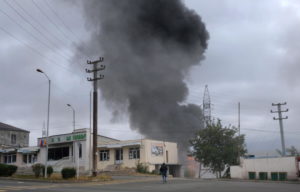
Esplosions in Nagorno-Karabakh
Alternating diplomatic efforts and tensions on the ground also endangered the EU observers present in Armenia since February 20, 2023, to contribute to stability in the border areas. On August 15, an EUMA mission patrol was involved in a shooting by undefined contours (both sides, Armenian and Azerbaijani, blamed each other), with no casualties. On August 15, an Euma mission patrol was involved in a shooting with unclear contours (both sides, Armenian and Azerbaijani, blamed each other), with no casualties. Only a month later, it seemed that the situation might slowly stabilize, with the passing of the first convoy with international aid on September 12 via the Ağdam-Askeran route and then the Lachin corridor unblocking on September 18 after almost nine months of humanitarian crisis. Not even 24 hours later, however, the Azerbaijani bombings against the separatist enclave began, which, due to the disproportion of forces on the ground, resulted in the ceasefire and lightning surrender of the Stepanakert military, with the total takeover by Baku soldiers.
English version by the Translation Service of Withub